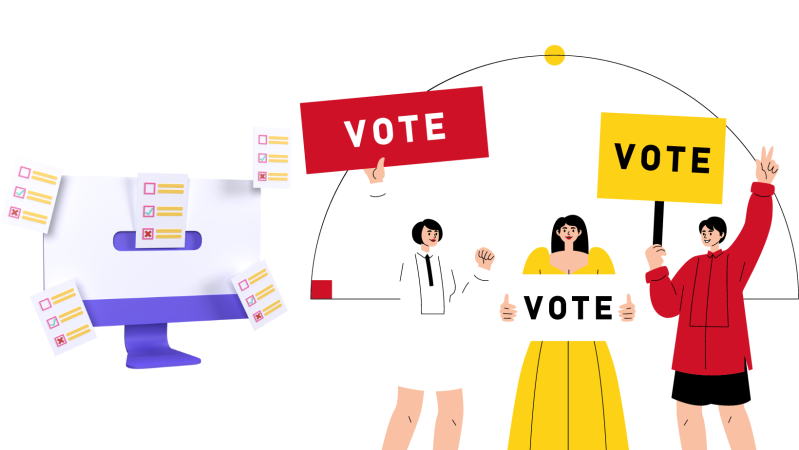IAWRT 2022 Elections
IAWRT members will soon elect a new international board to run the organisation. The Election will be held ONLINE in late September BEFORE the November 18 Biennial in Tanzania.
Nominate a colleague or become a candidate and vote in September! Nominations are now being received. and will close on August 28, 23H GMT. Membership fees must also be up to date by that date.
The election will again be held online, and paid-up members will receive a secure link to vote.
Candidates should note that they are being asked to provide a video or audio piece to explain their aims to the members. Nomination forms have also been updated for 2022.
August 8 nominations open
September – the elections committee will make that election material available to voting members and also arrange opportunities for online meet-the-candidate sessions.
September 28, 23H GMT voting starts via the link issued to members
October 2, 23H GMT voting ends
October 3/4: Results will be issued. Incoming members will be invited to join the outgoing board as non-voting members in order the become familiar with IAWRT operations.
Election Committee Guidelines for IAWRT 2022 election
2022 President IAWRT Nomination form
2022 Vice President IAWRT Nomination form
2022 Treasurer IAWRT Nomination form
2022 Secretary IAWRT Nomination form
2022 Board Member IAWRT Nomination form
Draft Code of Ethics & Election Guidelines
NB: Read forms carefully, they have been updated for 2022, and good luck!

Each of the members has been talking to past board members to get their views – read on.
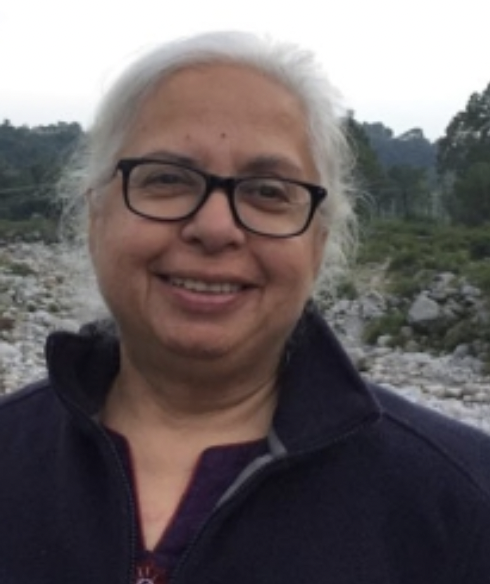
Interview with Reena Mohan – IAWRT board member 2020-2022
by Rose Haji Mwalimu
July 2022
- What does it mean to be a board member? What inspired you to become a board member?
It’s been a bit of a tradition to have a board member from the India Chapter. Archana Kapoor was my predecessor on the board and when she decided she didn’t want to run another term I think I was pushed into contesting the elections.
- What do you think the role of a board member is, in particular, but also on IAWRT’s mission, in defining the parameters and the choices?
During my term on the board, we’ve had two crises that the network had never dealt with before. As soon as the elections got over, we had to hit the ground running. Icy, our Communications Officer, was arrested and we had to appeal for her release, collect funds to cover legal expenses, etc. Later in August 2021, the Taliban took political control over Afghanistan and our chapter there was in disarray. Many members received death threats and had to flee their homeland. I think I am happy that I could contribute on both occasions towards helping in times of acute distress.
I really think that the work of a board member is non-stop. However, it’s impossible to be active professionally and also be engaged full-time with the work of the board. It helps to have committees where the duties are segregated either according to the office you hold, the country you’re from, the specific talents you may have… everyone works together as a team towards the growth of the network but in separate committees.
I am part of the Afghanistan crisis committee as well on the Mentoring Program. Two new committees. It’s been very rewarding because I’ve worked closely with other members and together we really have contributed something.
- You have lived through so many changes in so many different IAWRT governing boards from the time you joined the organization. What would you say are the significant changes to put into record?
I joined IAWRT in 2010 and became head of the India Chapter from 2012- 2015. During my term in office, we streamlined the functioning of the chapter (strengthened and improved the Asian Women’s Film Festival, began filing tax returns, obtained government clearance to receive donations, and made connections with several NGOs and organizations to fund some of our activities, pushed towards setting up the Afghanistan chapter, helped set up the Herat International Women’s Film Festival, etc)
This is my first term on the International board and I have already spelled out what I have done.
- You are an incumbent board member to have volunteered for one term, what are your experiences in ensuring growth of the organisation? What do you give and take from IAWRT?
Two incidents – Icy’s arrest and the Taliban takeover – have shown how useful it is to be part of a network that can lobby on your behalf and be a source of strength and moral support.
- How is IAWRT’s mission trying to achieve change on the globe, particularly women or younger generations?
I think we haven’t done enough as far as attracting younger members is concerned. We also haven’t done enough tapping into the vast pool of talent we have among the younger lot. We need to continue with scholarships and chapter activities. We need to have more solid ongoing research work and surveys. We need to have chapters connecting better with each other. We need a digital archive so that members can get a sense of the history of the network and access the work that’s been done previously (films, research projects, etc). We should be doing lengthy interviews with older members as ongoing documentation. There’s a lot that needs to be done not necessarily by board members but across the globe among members in general.
- IAWRT is publicizing the upcoming 2022 election, are you intending to vie for any position? Why?
Not standing this year. It’s very demanding and I have had to invest a lot of time and energy in many activities. I feel exhausted and want to slow down.
- What is your call to members?
It’s fun, it’s challenging. If you can work well as a team member, step forward and contribute your bit.
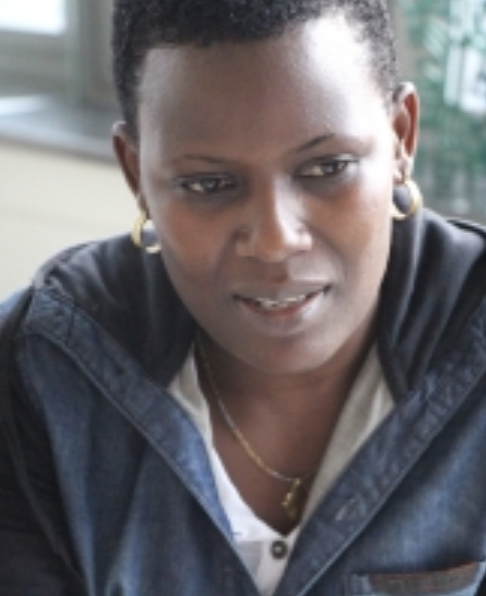
Interview with IAWRT Secretary Nankwanga Eunice Kasirye and former Secretary Violet Gonda
By Nonee Walsh
The simple answer is – it is hard administrative volunteer work, and its degree of difficulty very much depends on what country you are in and what resources you have at your disposal. It is inadvisable to nominate for this position if you have not served at least one term on the IAWRT International board and have time to devote to it.
Nankwanga Eunice Kasirye (Eunice) from Uganda, has served as IAWRT secretary since 2020. She served at the time when IAWRT no longer had dedicated organisational funding or dedicated full-time paid staff.
“I love IAWRT, I want it to blossom, because without IAWRT I would not have this global network I have through the members. Being the Secretary has given me a big experience – it helps me to revise how I look at things and how I do my work on other platforms, how I handle people, and their expectations. Realistically it is a big opportunity to explore my abilities.”
However, the IAWRT secretary is charged with responsibility for the secretariat – both external (newsletter editing / website) and internal (records board minutes etc), with no funding and only part time secretarial support from another country, so it can be very hard work. The IAWRT Secretariat in 2022 is in fact one person in the Philippines, employed half-time to be the communications officer and responsible for administration required by the President and the board.
Eunice does not edit the website, but writes statements and reports, as well as organising for board and chapter heads meetings, along with other responsibilities, as assigned.
‘It can be almost a full-time job to meet expectations: to prepare agendas and minutes for the board, support committees and chapters, check reports to members and the newsletters, without direct support” she says.
Outgoing IAWRT President, Violet Gonda says “above all, time and commitment is key! People in full time jobs may not be able to handle this position properly.”
“The position requires someone with time, who can write and is a communicator. That person has to be able to step in and complement the Communications Officer and also communicate with members and not wait for instructions… they must be able to take initiatives… and be able to supervise others.”
Violet served two terms as IAWRT secretary before becoming treasurer in 2015, when IAWRT was just emerging from a period when many board members from Europe had been supported by their broadcasting employers for many decades, to do work for IAWRT. It was a very different organisation then, with base funding from Norwegian FOKUS close to ending and the organisation starting to operate on project by project funding.
The difficulties of being IAWRT Secretary are compounded in countries where private internet connections are expensive and often poor. This is especially an issue for women working for government media or government itself, who are constantly monitored, necessitating personal investment in computers, VPN’s, or independent communications methods in order to work for IAWRT.
Eunice says current project based funding has created a situation where members might be legitimately paid to work on projects, but supervision and due diligence is falling to IAWRT’s unpaid executive members, who can become demoralised, doing unrecognised unpaid work after their full-time jobs.
Nonetheless, Eunice believes that the situation can be dealt with by clarity – “clear rules for the board to improve operation, where members agree to disagree, to create a collegial environment and maintain membership; to ensure that members who demand clarity on issues, never feel victimised or isolated and cliques do not form.”
“ There should be a spirit of free expression in the organisation,“I do feel that the board can do better, to operate as an international association of women in radio and television, where criticism can be heard and discussed freely and every member – board or ordinary – feels supported in their work in the media, whatever or wherever that is.”
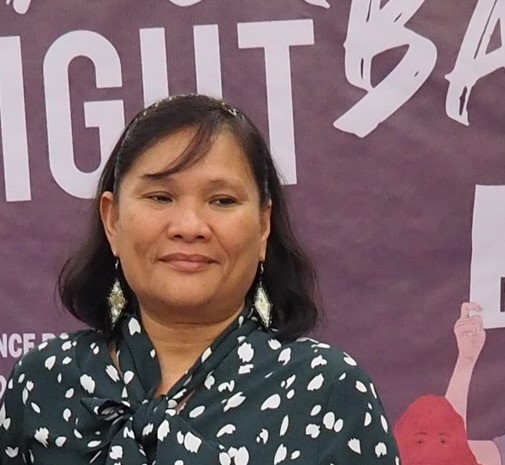
Jola Diones Mamangun, Treasurer of IAWRT from 2017 – 2022
By Frieda Werden
“Working as IAWRT Treasurer is a bit stressful. but challenging. I love numbers. I love new ideas. Learning while working is my principle. Since I chose the position for two consecutive terms, I was obliged to work hard to meet the expectations of the board and the organization. I have done my best.
Working without an IAWRT accountant or a finance officer is really another challenge. I am doing the job alone, without payment, but I still want to continue helping out. I loved being the treasurer and I want to thank IAWRT for choosing me and trusting me.
“We don’t need an expert, but we need an honest person for this position.”
Here is a general list of duties of the IAWRT Treasurer, as carried out by Jola during her term in that office – followed by her answers to specific questions:
- I am a member of the fundraising committee whis has the task of looking for funds for IAWRT’s plans and program. Even small funds, like the Journalism and Media International Center in Norway and Taiwan Foundation for Democracy, these really help IAWRT, especially for payment of a the part-time Communication Officer.
- I check the financial report from the accountant (Solveig Helvig in Norway did that in the past, then Sanaf Marcelo in the Philippines for a short time). But I’m sad to say I am the one who has been doing the financial report for three years now.
- Write to the members and chapter heads about paying their IAWRT membership dues.
- Keeping all the financial records, which in the past has been the task of the accountant.
- Do the finalisation / liquidation of any funded project and hand it to the external auditor.
- Manage small projects for IAWRT. Larger ones should be managed by the executive board.
I gave my time almost fulltime, in recent years for IAWRT.
What bookkeeping or accounting software (if any) is used by IAWRT?
We are using a spreadsheet from Mac.
What forms and specific reports must be filled out (for instance, to report to taxing authority in the Philippines)?
After an annual report for IAWRT, we submitted it to the external auditor. Then she audits it and submit it to the Bureau of Internal Revenue (BIR), then to the Securities and Exchange Commission (SEC) in the Philippines. These are all required from all non-profit and non-commercial incorporations.
Does the Treasurer reimburse expenses, and how is that done? Who authorizes it, and what method(s) are used for funds transfers?
Yes, I did the reimbursements directly, (if there are any – it is very minimal). But before that, it was the admin and finance officer who collated the receipts for reimbursement, then I would check and approve it. We have no budget for the admin and finance now.
Do different funders require different kinds of financial statements in their applications and different kinds of interim and final reports?
Yes, every funder has their own type of financial statement and report. Some of them have templates. If the project is small, they will not require a finance auditor. But if the project is big, we need an auditor for the project.
Don’t non-profit annual reports have to be audited by a registered accountant? If we don’t have one, I presume we will need one. How much money needs to be raised to pay for such services?
The payment for the registered accountant or financial auditor is based on the amount of the project. There is no standard payment. IAWRT International has an external auditor. For a yearly report, we pay her $100. For project reports, it ranges from $250 to $1000 and 1000 Euro.
Where is IAWRT International’s non-profit status registered? Do we have to use an auditor based in that country?
IAWRT International is registered in the Philippines. So, the financial audit must be done in the Philippines. It is also registered in Norway, I believe.
If the treasurer is in a different country do we keep the same bank account? If so, how is the handing over of the signing to a new person done?
The issue of the treasurer must be discussed by the new international board for 2022. Even if the treasurer is not a Filipino, there must be an accountant or admin and finance to handle the finances of IAWRT in the Philippines. The admin and finance must be a Filipino. All the financial transactions made by the admin and finance must be approved by the treasurer or the executive board.
Do checks and funds transfers have to be co-signed, or does the treasurer have sole authority? Is there a backup treasurer who is ready to step in if necessary?
Right now, me (treasurer), Icy, Lady Ann Salem (communications officer) and Sanaf Marcelo (past
admin and finance staff) are the signatories on the IAWRT bank account in the Philippines. Every transaction needs two signatories. We created a local board (IAWRT International) to apply for the bank account. Foreigners are prohibited from SEC registration in the Philippines.
Are there ongoing fundraising projects the new Treasurer would be expected to pick up?
IAWRT has ongoing projects – IMS for the Digital Safe House (DSH) Philippines, UNESCO and JMIC for the Climate Change projects. IMS/CAOV for Moldova/Ukraine DSH project. I will suggest to the new international board that I should finish the liquidations and reports of those 2022 projects, before I step down.
What does the cash flow of IAWRT look like?
The cash flow is dependent on the administrative funds from IAWRT projects and regular payment of memberships, helps. We only need to pay the secretariat, which is Icy as communication officer, because we have no budget for a membership officer and administration and finance staff. There are some small expenses like transportation to the bank ($6 per transaction), internet fees for the treasurer ($30/month) and the yearly gift to the staff in the Robbinsdale Residences (our old office) as they allowed us to use their space for the address of the secretariat office.
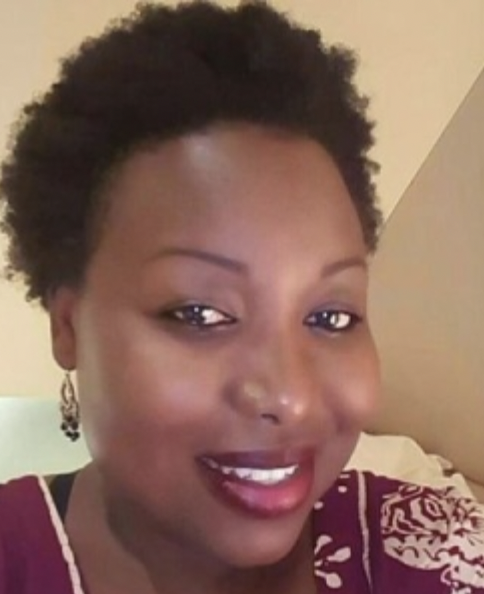
Interview with Violet Gonda IAWRT President 2017 -2022
By Anupa Shrestha
Experiences were Challenging but Fulfilling…
You have been in the IAWRT board in different roles as a treasurer, secretary, and president. How was your experience serving IAWRT board in different roles?
Secretary and Treasurer: I was fortunate enough to work in these two roles during the time that IAWRT was fully funded by FOKUS… so we had a funded secretariat that ran the day-to-day business under my supervision. I was able to fully monitor the running of the organisation in my role as secretary, assisted by the communications officer; and as Treasurer assisted by the Finance Office.
When you have these support systems in place the workload is easier and you are able to focus more on the various parts of your roles and responsibilities as stipulated in the Guiding Documents.
President: This was different, as I inherited an organisation without funding and without proper support systems for office bearers, resulting in serious challenges. It meant being distracted from the practical side of running the organisation’s project and activities. I have spent more time trying to keep the organisation afloat and fundraising – a job that ideally should have been for an administrator/fundraiser.
IAWRT was spoilt, with having only one funder for 20 years, so this meant when we lost our funding in 2017, we had to start from the beginning to build networks, partners… to establish ourselves on the world map… that takes time – and in a way, that is one of the most important areas I had to tackle as President. You can write the best proposals in the world but nowadays, if your organisation is not known, that application just goes to the bottom of the pile… I am proud to say we have now built a strong network of strategic international partners – and some of them, like the International Media Support (IMS) has also started fundraising on our behalf and introducing us to potential donors…It certainly helped that I had a dedicated Treasurer (Jola), who has been my right-hand person from the very beginning. But it meant as President, I spent most of our time doing proposals, setting up meetings (some I had to self-sponsor, to meet potential partners).
You had to face crisis like the covid pandemic and also the new method of electronic elections during your terms as president. How did you overcome the challenge?
Despite the Terrible Effects of the COVID Pandemic …
This crisis actually helped us reunite and pull together our network. The world went virtual and so did IAWRT. We moved all our activities online and we were able to conduct a record amount of panel discussions, seminars, and workshops on various issues and with multiple international organisations.
We also connected with the Oslo Metropolitan University (OsloMet) Journalism and Media International Centre (JMIC) and partnered with them to conduct webinars on the safety of journalists and climate change issues; not only were we able to now involve our members from all over the world (something a physical biennial could not do) but we were also to get funding for this… including funded virtual chapter activities…. even chapters that had been dormant for many years, e.g Cambodia, Tanzania and Moldova. We even organised our first ever All Africa Chapters event and secured funding for it.
As President, I have maintained contact with all these organisations and have formal virtual meetings regularly with the JMIC, UNESCO, IMS etc.
We delivered e-voting, an election that ran smoothly and involved many more members than before – and it was conflict-free… an issue that is very important to me as past face-to-face elections marred biennial conferences. Conferences were becoming toxic environments because of the competitive nature of elections.
What did take from IAWRT in this long period of working?
I ran for office in 2017 on a campaign to rebuild the organisation – even though the funding situation is still work in progress – I believe this board has managed to put structures in place to help professionalise the organisation. We have created several working committees to help run specific activities… e.g Mentoring Committee, Digital Safe House Committee, Afghanistan Committee, Climate Change, Long Doco etc… all to compliment the work of the board and follow through with work required for their respective Committees … we even drew up a 5 year strategic plan to complement our statutes and guiding documents on what and where we want the organisation to be in the next few years. Rome was not built in a day but at least it’s a start and I will always be available to help the organisation when needed.
How is the IAWRT’s mission trying to achieve change on the globe, particularly women or young generations?
We are partnering with likeminded organisations to be at the forefront of global issues to do with women in the media. Our strategic plan illustrates this mission very well. IAWRT is more visible internationally now as we issue statements on significant world events, we are invited to participate in international campaigns, and we hope projects such as the Digital Safe House platforms will help to create safe spaces for women journalists at risk.
What is your call to members?
The Board and the Secretariat cannot do it on their own… every member has a duty to step up and be part of this organisation… IAWRT needs members to be more active to help keep the organisation grow.
What is your future plan with IAWRT?
To handover an organisation with a ‘fighting chance’ to the next board… IAWRT has to stand for something and be known internationally for spearheading specific causes – one of those is designing digital safe houses… we have already started the ball rolling in the Philippines, Afghanistan and Moldova… We need core projects that help our members and address global issues such as climate change activities… We also need to continue with our mentoring activities as they not only help provide much needed skills training for our members but also help to maintain and develop relations between our more experienced/veteran members and the younger/new members.

